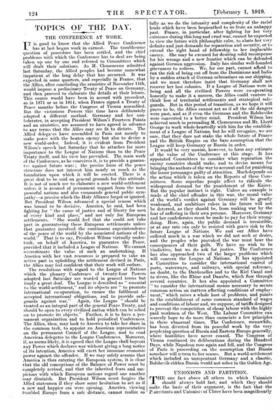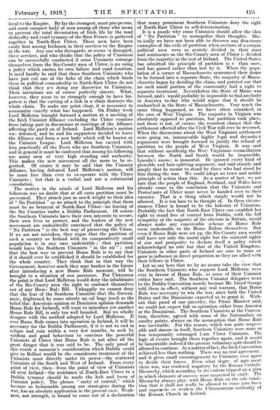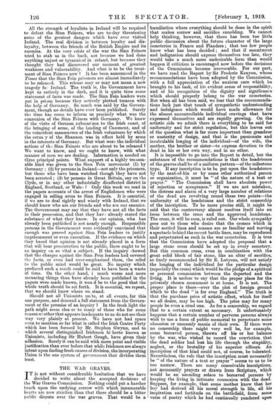UNIONISTS AND PARTITION.
THE one fact above all others to which Unionists should always hold fast; and which they should make the basis of their ar&niment, is the fact that the Protestants and Unionists of Ulster have been magnificently loyal to the Empire. By far the strongest, most-proipemns, and most compact body of men among all those who mean to prevent the total devastation of Irish life by the mad disloyalty and cruel tyranny of the Sinn Feiner; is gathered together in North-East Ulster. These men have been easily first among Irishmen in their services to the Empire in the war. Any one who disregards, or seems 'o disregard, these services, and who thinks that the policy of Unionism ran be successfully conducted if some Unionists estrange themselves from the Six-County area of Ulster, is pu suing a policy which carries its own failure and cond Innation. It need hardly be said that those Southern Unionists who have just cut one of the links of the chain which binds them in political comradeship to North-East Ulster do not think that they a-e doing any disservice to Unionism. Their intentions are of course perfectly sincere. What, however, they seem to us strangely enough to have for- gotten is that the cutting of a link in a chain destroys the whole chain. To make our point clear, it is necessary to summarize exactly what has happened. On Friday week Lord Midleton brought forward a motion at a meeting of the Irish Unionist Alliance excluding the Ulster counties from taking part in discussions at meetings of the Alliance affecting the partit on of Ireland. Lord Midleton's motion wit I defeated, and he and his supporters decided to leave the Alliance and form a new body which will be known as the Unionist League. Lord Midleton has carried with him practically all the Peers who are Southern Unionists, and in general it must be confessed that among his following are many men of very high standing and authority. This makes the new movement all the more to be re- gretted. Of course it may be said that the Unionist Alliance, having defeated Lord Midleton's motion, will be more free than ever to co-operate with the Ulster Unionists ; but that is a verbal and not a substantial consolation.
The motive in the minds of Lord Midleton and his followers was no doubt that at all costs partition must be prevented. They attach just as much weight to their idea of " No Partition " as we attach to the principle that there must be no betrayal of North-East Ulster—no forcing of the Six Counties under a Dublin Parliament. Of course the Southern Unionists have their own interests to secure, their own lives to protect, and the leaders of the new movement are undoubtedly convinced that the policy of " No Partition " is the best way of preserving the Union. If we are not mistaken, they argue that the partition of such a country as Ireland with its comparatively small population is in any case undesirable ; that partition would leave the Southern Unionists " in the air " ; and that the best way to prevent Home Rule is to say that if it should ever be established it should be established for the whole country. They think that in that way the Government, however much they may hanker in the future after introducing a new Home Rule measure, will be brought to a situation of non possumus. For Ulstermen the point is that Lord Midleton would deny the inhabitants of the Six-County area the right to contract themselves out of any Horn:. Ruls Bill. Unhappily we cannot deny that the fear of the Southern Unionists that the Govern- ment, frightened by some utterly uweal bogy (such as the belief that American opinion or Dominion opinion demands Home Rule for Ireland), will want to introduce yet another Home Rule Bill, is only too well founded. But we wholly disagree with the method adopted by Lord Midleton. If ever Home Rule comes into operation in Ireland, it will be necessary for the Dublin Parliament, if it is not to end in eclipse and ruin within a very few months, to seek by wisdom and good behaviour to convince the powerful Unionists of Ulster that Home Rule is not after all the great danger that it was said to be. The only proof of this worth a moment's consideration which Dublin could give to Belfast would be the considerate treatment of the Unionists most directly under its power—the scattered Unionists of the South and West of Ireland. From every point of view, then—from the point of view of Unionists all over Ireland—the resistance of North-East Ulster to a Dublin tyranny should be made the hub and focus of Unionist policy. The phrase " unity of control," which became so fashionable among our strategists during the war, has an absolute application in the present case. Weak- ness, not strength, is bound to come out of a declaration
that many prominent Southern Unionists deny the tight of North-East Ulster to self-determination.
It is a puzzle why some Unionists should allow the idea of " No Partition " to monopolize their thoughts. His-
t° ically we have not been able to discover any disastrous examples of the evils of partition when sections of a certain political area were as acutely divided in their aims and sentiments as the Six-County area of Ulster ii divided from the majority in the rest of Ireland. The United States has admitted the principle of partition m- r than once, and has gained rather than lost by it. When the popu- lation of a corner of Massachusetts announced their desire to be formed into a separate State, the majority of Massa- chusetts began by deriding the claim, and pointed out that no such small portion of the community had a right to separate treatment. Nevertheless the State of Maine was formed, and i. would probably be impossible to find anybody in America to-day who would argue that it should be reabsorbed in the State of Massachusetts. Very much the same thing happened, as we have often remarked, in
the case of West Virginia. The majority in Virginia was absolutely opposed to partition, but partition took place,
and there is not, of course, the remotest chance that the settlement effected after the Civil War will ever be reversed. When the discussions about the West Virginian settlement
were going on, innumerable highly legal and dryasdu,t
arguments were brought forward to justify the refusal of partition to the people of West Virginia. It was said that without sacrificing the West Virginians reconciliation between the North and South would be impossible. Lincoln's answer is immortal. He ignored every kind of plausible and hair-splitting argument, and said stoutly and simply that he meant to stand by those who had stood by him during the war. We could adopt no truer and nobler principle of action than this. As a matter of fact, we are sure that the people of England, Scotland, and Wales have already come to the conclusion that the Unionists and Protestants of Ulster must never be handed over to their enemies. That is a thing which simply would not be allowed. It is too base to be thought of. In these cirmun- stances Ulster is bound to be the lodestar of Unionism.
Probably the fact that North-East Ulster can establish her right to stand free of control from Dublin, with the full sympathy of the majority of the electors in Britain, would always make any conceivable scheme of Home Rule seem undesirable to the Home Rulers themselves. But even if Home Rule were set up, the Six-County area would still have not only the moral right but the material rights of size and prosperity to declare itself a polity which acknowledged no rule but that of the United Kingdom. Unionists in other parts of Ireland are sure to wane or grow in influence in direct proportion as they are allied with their fellows in Ulster.
Let us say here that we by no means take the view that the Southern Unionists who support Lord Midleton were ever in favour of Home Rule, as some of their Unionist critics have said. The Southern Unionist delegates went to the Dublin Convention merely because Mr. Lloyd George told them in effect, without any real warrant, that Home Rule was necessary to win the war, since both the United States and the Dominions expected us to grant it. With- out that proof of our sincerity, the Prime Minister said, we could not expect full co-operation either from America or the Dominions. The Southern Unionists at the Conven- tion, therefore, agreed with some of the Nationalists on sundry points, always on the assumption that Home Rule was inevitable. For this reason, which was quite respect- able and sincere in itself, Southern Unionists were more or
less temporarily estranged Lost Ulster Unionists. The logic of events brought them together again, and it would
be lamentable indeed if the present voluntary split should be allowed to continue. As a matter of fact, the Irish Convention achieved less than nothing. There was no real agreement ; and it gives small encouragement to Unionists ever again to divide their forces. Even what degre of agreement there was, was rendered nugatory by the Roman Catholic Hierarchy, which according to its custom tripped up a plan in which elements of success were suspected to exist, The Hierarchy always play.; with Home Rule on the sole condi- tion that it shall not really be allowed to come into force and supenside or weaken the Ultramontane authority of the Roman Church in Ireland.
All the strength of loyalists in Ireland will be required to defeat the Sinn Feiners, who are to-day threatening some of the greatest dangers which have ever visited Ireland. The real division is between loyalty and dis- loyalty, between the friends of the British Empire and its enemies. At the very crisis of the war the Smn Feiners tried to stab us in the back, not because we had done anything unjust or tyrannical in reland, but because they thought they had discovered our moment of greatest weakness and vulnerability. And what is to be the treat- ment of Sian Feiners now ? It has been announced in the Times that the Sinn Fein prisoners are almost immediately to be released. This release may or may not mean a new tragedy fo: Ireland. The truth is, the Government have kept us entirely in the dark, and it is quite time some statement of facts was made. The Sinn Rein leaders were put in prison because they actively plotted treason with the help of Germany. So much was said by the Govern- ment, though no details have ever been published. Surely the time has come to inform us precisely what was the connexion of the Sinn Feinera with Germany. We know of the visits of German submarMes to the Irish coast, of the bringing of arms, of the landing of Casement, and of the coincident manmuvres of the Irish volunteers by which the estua y of the Shannon was in effect held by arms in the interests of Germany. But what were the individual actions of the Sinn Feiners who are about to be released We want to know, and we ought to know, with what manner of men we are dealing. -Information is needed on three principal points. What support of a highly treason- able kind was given to the Sinn Fein movement (1) by Germany ; (2) by persons in Ireland—not only the prisoners, but those who have been watched though they have not been arrested ; (3) by persons in Great Britain, say on the Clyde, or in any other industrially disaffected district in England, Scotland, or Wales ? Only this week we read in the papers accounts of the arrest of Englishmen who were engaged in selling arms to Sinn Feiners. It is essential, if we are to deal rightly and wisely with Ireland, that we should know who are our friends and who are our enemies. The Government may say that they have not all the facts in their possession, and that they have already stated the substance of what they know. In our opinion, wha has already been published is not nearly enough. Responsible persons in the Government were evidently convinced that enough was proved against Sinn Fein leaders to justify imprisonment or even execution. If the evidence on which they based that opinion is not already placed in a furor that will bear presentation to the public, there ought to be an inquiry on so vital a subject. If the inquiry showed that the charges against the Sinn Fein leaders had covered the facts, or even had over-emphasized them, the relief to the public mind would be great. No inquiry which produced such a result could be said to have been a waste of time. On the other hand, i much worse and more menacing things than have already been published in the papers were made known, it won d be to the good that the whole truth should be set forth. It is essential, we repeat, that we should know where we stand.
Should not all Unionists note, at all events, for this one purpose, and demand a full statement from the Govern- ment or the promise of an inquiry In the fresh light the path might seem oleo. er to many of those who for some reason or other that appears inadequate to us do not see their way very plainly at present. We have not had space even to mention so far what is called the Irish Centre Party which has been formed by Mr. Stephen Gwynn, and to which several distinguished Irishmen hi herto known as Unionists, including Sir Hubert Gough, have given their adhesion. Surely it can be said with more "int and visible justification than ever before that while Iris en are always intent upon finding fresh causes of division, the incorporating Union is the one system of government that divides them least.




































 Previous page
Previous page